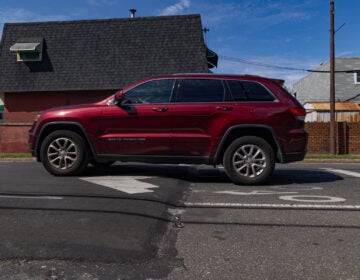Mt. Airy’s Nesting House grows beyond cloth-diaper origins

The Nesting House is located on Carpenter Lane in Mt. Airy Village. (Michael Buozis/for NewsWorks)
When her first child was born, Germantown resident Jen Kinka went online to research cloth diapering.
“In cloth diaper land, 2006 was a long time ago,” Kinka writes in a blog entry about her early parenting experiences. “There was no store to go to and no local workshops to take.”
Kinka started off by sewing her own diapers and notes that it “didn’t go so well.”
So she turned to the internet to buy cloth diapers for her daughter.
‘The Diaper Lady’
“Before I knew it I was buying them for the whole neighborhood and running workshops at the Maternal Wellness Center,” Kinka writes.
She started selling diapers off her front porch and founded the Philadelphia Cloth Diaper Connection. People in the neighborhood knew her as “the diaper lady.”
Then in May 2010, when Maternal Wellness Center closed its doors at 606 Carpenter Lane in Mt. Airy, Kinka and the center’s co-founder Meredith Jacoby opened The Nesting House, a retail shop specializing in natural and sustainable parenting products, in the center’s old storefront.
In Jan. 2013, when Jacoby departed The Nesting House, Kinka’s husband, Chris, stepped in to help run the store as a family business. In July of that year, they opened a second location in Collingswood, N.J. Now, the Kinkas hope to expand to a third store in Philadelphia.
The Nesting House offers natural parenting products, new sustainably-sourced toys and gently-used clothing.
In the neighborhood
Chris Kinka describes the store’s business model as “less boutique and more coffee shop. We’re relying on somebody spending $4, many times per week, instead of making one large purchase only once in a while.”
“We’re right next to the co-op [Weaver’s Way] and the coffee shop [High Point Cafe],” says Kinka, “so stopping by the store is within people’s routine.”
On the other hand, much of the new merchandise sold at The Nesting House — the toys and natural parenting products — is expensive compared with more conventional choices sold at big box retailers. Customers can make these purchases more manageable, says Kinka, by reselling clothing their kids grow out of to accrue store credit.
Yet despite the low price of their used clothing, the Kinkas are selective when purchasing. “We probably buy 20 percent of what comes in. We stress gently-used, so condition is very important,” says Kinka.
The Nesting House also offers a new mothers support group and workshops on cloth diapering and babywearing — helping new parents figure out how to use those complicated baby carriers.
Those workshops brought Germantown resident Jai Wexler to The Nesting House even before her son, who just turned one, was born.
Wexler, unlike many new parents, did not make major purchases before her son was born.
“Instead, for the shower we just asked for gift certificates to Whole Foods and Target and Weaver’s Way and The Nesting House,” Wexler says. “We got so many gift certificates [to The Nesting House] they said they never had a customer with so much credit.”
Wexler says the store draws her back mostly for the affordable clothing, though she does often buy new toys there as gifts for friends’ kids.
Bucking the trend
While the Kinkas have succeeded with sustainable and environmentally-conscious family-owned retail, new research suggests that the buying habits of millennials shift toward more traditional big box retailers when they become parents.
Jeff Fromm, co-author of “Marketing to Millenials,” told NewsWorks, “If all else is equal, the sustainability of a product can be a tipping point in the purchasing decision. But it’s just one of many factors.”
In a 2013 study conducted by the independent advertising agency Barkley, researchers found that millennial parents favor big box stores, like Wal-Mart, more than parents from generation-X or baby boomers.
Customers of The Nesting House, however, remain loyal, says Chris Kinka.
“It’s also an economic decision,” he says. “It’s hard to justify spending five times as much on disposable as on cloth diapers over your child’s years in diapers.”
Many of the Mt. Airy location’s loyal shoppers are lost when their children grow out of the store, says Kinka. The biggest challenge for parents of older children is often finding affordable clothing. “
Our customers are used to paying $4 for pajamas and then they’re being asked to pay $30 if they don’t want to sacrifice on quality,” Kinka says.
Wexler, whose one-year-old son is a long way from growing out of The Nesting House, says she’d love to see the Kinkas expand and start carrying clothes for older children.
Expanding into carrying goods for older children comes with a particular set of challenges, says Chris Kinda.
“When kids’ growth rates slow down, they wear their cloths longer, and they’re harder on them. Especially boys. It’s really difficult to find a pair of used jeans for a 6- or 7-year-old without holes in the knees.”
WHYY is your source for fact-based, in-depth journalism and information. As a nonprofit organization, we rely on financial support from readers like you. Please give today.





